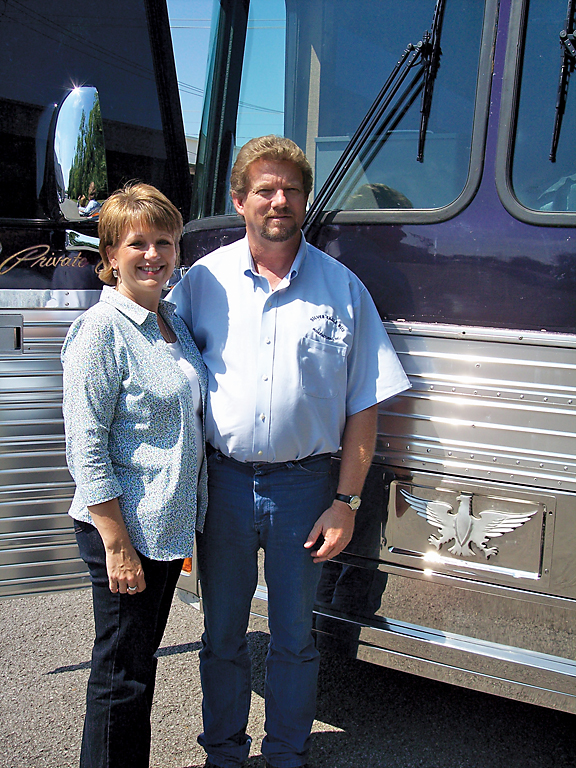The Silver Eagle Bus Co., whose manufacturing history traces to
The company has constantly evolved through the years. It once built buses for Trailways. It later gained fame for manufacturing buses for country music stars and other entertainers. Today, it continues to specialize in custom coaches for the entertainment industry, but also builds rigs for the 40- to 45-seat coach market.
Silver Eagle is owned and operated by the husband and wife team of Craig (COO) and Robin (CEO) Hanloh. They formed the new company in 2004 and revived the Silver Eagle name after the previous management went bankrupt in the late 1990s. They began manufacturing in the company’s last home of
Robin Hanloh says business conditions were not good in
“We considered other cities within
But Hanloh says the move to
“Clay and Shirley had it head and shoulders over the rest in terms of knowing their business and what the economic development role is supposed to be for their city,” Hanloh says. “They also have created a network of support to help new or prospective companies come into
Ramping Production
Silver Eagle is operating in a temporary location in
Hanloh says the
“We knew we would not be able to hire many people right away, but people were so desperate for jobs, they came out immediately,” she says. “A lot of automotive-related businesses in the area have closed and there is a good supply of people with specific industry-related experience.”
Hanloh says the company initially wanted to just target the entertainer, or personal coach, market, but has since acquired the designs to build the company’s Classic Model 15 Eagle bus, which enables it to serve the seated coach market.
“The seated coach market is a lot better than the entertainment market for us now,” Hanloh says. “We are the only
Silver Eagle’s major competitors include Illinois-based Motor Coach Industries, which originated in
The Hanlohs’ interest in bus building originated with Craig Hanloh’s involvement in the dune-buggy and race-car-hauling-rig businesses. A bus-refurbishing project ignited an interest and provided contacts along the bus-building supply chain. During that time, the Hanlohs kept hearing about the merits of the Silver Eagle bus and became interested in acquiring the rights to build the famous line. Robin Hanloh, whose background is in management, became the CEO of the reborn company.
“I had always worked in management on the business side of manufacturing and production, so Craig asked my help to do this side of the business. So we formed a team and here we are.”
Hardened Defenses
Demand by the military and the private security sector is driving an array of industrial projects around the
HEAT Armor, also known as Herlihy Engineered & Armored Technologies, was founded in September 2008 and moved into a 50,000-sq.-ft. (4,645-sq.-m.) building in an old warehouse district in Chicago. HEAT Armor is in the commercial armored vehicle industry, serving well-heeled individuals who need protection.
Darren Flynn, HEAT’s vice president of sales and marketing, says the company converts vehicles such as Suburbans or Cadillacs by adding armoring systems to match a particular customer’s specialized needs, “be it handgun protection or assault rifle protection. We don’t talk about who our customers are because you can defeat every type of armored vehicle in the world if you know it’s armored. So, our customers try to remain anonymous.”
Flynn stresses that HEAT is not just a fabrication company, but also an engineering and technologies company. He says the engineering part of the equation is important to the reliability of the products. HEAT also serves as a sub-engineering company for larger military suppliers or larger armored production companies.
Granite Tactical Vehicles announced in December that it would expand operations in
In 2009, London-based BAE Systems opened a new 33,000-sq.-ft. (3,000-sq.-m.) manufacturing facility in
CoorsTek Armor Solutions, a subsidiary of technical ceramics specialist CoorsTek, has opened a new manufacturing facility in Golden,
